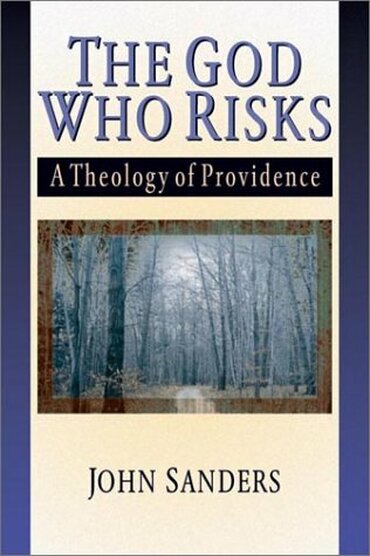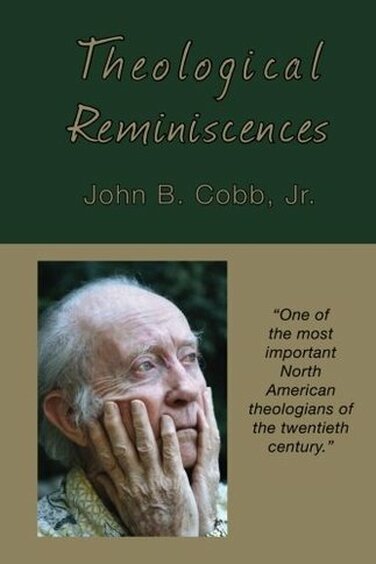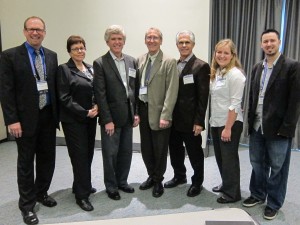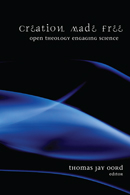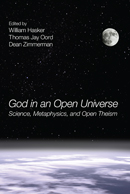Back to the Basics, Part 4:
Open Theism v Process Theology
by R.E. Slater
I thought I would review a few past articles beginning with ReKnew's 2019 and then two 2015 articles by Tom Oord.
I
In contrast to Reknew's theological "barriers" in the first article below, the process position states:
i) God positively interacts with creation because God is present in creation;
ii) prayers, of course, request a partnership between God and the petitioner;
iii) miracles are "common" everyday happenings whether we recognize them of not (I call them synchronicities); and,
iv) much like the Holy Spirit infilling the Christian believer, so too did God's Spirit infill Jesus.
Consequently, I have little sympathy towards any Open theist's misstatements about process theology....
II
And when reviewing Dr. Oord's 2015 early thoughts between Open and Process theology I can only say much, much, much has changed since then.
The process community certainly spans the evangelical and post-evangelical church but the latter post-evangelical distinction will grant the greatest flexibility and "openness" to theological thought.
That is because Whitehead's process philosophy is allergic to anything analytically Western, inorganic, non-relational, and non-open. The Continental position helps to bridge the gap between the Westernized philosophical camps but Process Philosophy is it's own thing.... One might even say the British philosopher AN Whitehead picked up where Continental philosopher GWF Hegel had left off re cosmological metaphysics a hundred+ years later.
Further, Process theology requires Open theology to be combined-coupled-integrated with Relational theology. The proper description then is a process theology which is open and relational. It is never one or the other. All relationships are open... and anything which is open is relationally dependent.
More to come...
R.E. Slater
May 20, 2024
* * * * * *
Process Theology & Open Theism:
What’s the Difference?
March 19, 2019
Question: When ReKnew talks about Open Theism is it a mistake for people to equate it with Process theology, and if so what are the defining differences?
Answer: Thanks for the kind words of affirmation. I wrote my doctoral dissertation on Process thought (Trinity and Process) where I critiqued the metaphysics of Charles Hartshorne and tried to demonstrate that one can adopt a system that has all the explanatory power of Process Thought (PT) without its unorthodox implications. The unorthodox implications are these. In Process Thought (PT), God exists eternally in relation to a non-divine world. So PT denies “creation ex nihilo”
- In PT, God is bound to metaphysical principles that govern both God and the world. So God isn’t able to really interact with the world as a personal being. God must always, of necessity, respond in ways that the metaphysics of the system stipulate. This means…
- In PT God can’t intervene in unique ways, like personally answering prayer
- In PT God can’t intervene and perform miracles
- In PT God can’t become uniquely embodied, as he is in Christ.
These are pretty serious shortcomings. I hope it’s clear that PT has got little in common with Open Theism other than that we both believe the future is partly comprised of possibilities. But even here there is a major difference. In Open Theism, God chooses to create a world with an open future, while in PT God has created of necessity.
I am very concerned that so many progressive thinking evangelicals are flirting with Process Thought. It’s really not a friendly home for anything like orthodox Christianity. While many find the dynamic and relational ontology of process thought, compelling—I can see how this is attractive— the intrinsic nature of the system is hostile to the Christian faith.
If you want to go deeper on this topic, my book
Trinity and Process seeks to clarify all that’s positive with PT while avoiding all that’s negative. For a succinct summary of some of the shortcomings of PT, see chapter 9 in my book
Satan and the Problem of Evil.
* * * * * *
The Future of Open Theology
by Thomas Jay Oord
January 2, 2015
Open theology has matured in many ways since the ground-breading publication of The Openness of God book twenty years ago. I’ve been thinking about what the next twenty years might be for open theology.
At an Open and Relational Theologies group session at the recent American Academy of Religion meeting, I joined three of the authors of The Openness of God for reflection on the book’s impact. It seemed like the right time to celebrate the 20th anniversary of the book’s publication.
I am deeply grateful to the five authors of The Openness of God: David Basinger, William Hasker, Clark Pinnock, Richard Rice, and John Sanders. The book has been powerful in my own life and in the lives of many Christians like me who were not satisfied with what Clark Pinnock called “conventional” theism.
I encountered the book not long after it was published in 1994. It confirmed many of my own intuitions, as one raised in the Arminian/Wesleyan/Holiness tradition. Since reading the book, I’ve encountered many others who after reading it said, “That’s something like what I’ve been thinking, but I thought I was the only one!”
Openness writers expressed their ideas in biblical language typical of the Christian tradition in general and my own evangelical-Wesleyan tradition in particular. And as Dave Basinger has said, The Openness of God created more space for Evangelicals like me to deny classic views of God’s foreknowledge.
Now that 20 years have passed, I’ve been thinking about the future of open theology. Of course, open and relational theists like me who think the future is not yet knowable by God should be the first to admit we don’t know what the future will be! But I want to look at the present state of open theology, as I see it, and speculate about what the future might be.
Philosophy
Open theology has made an impact in a variety of academic disciplines, schools of thought, and ways of thinking. Some of its greatest success has been in analytic philosophy circles. Thanks to the efforts of many, including two of The Openness of God authors, David Basinger and Bill Hasker, it is common for an openist philosopher to be given hearing at philosophy of religion conferences. Some do not specifically self-identify as openist philosophers, but their views of God’s relation to time and foreknowledge place them in the openist camp.
In the future, I speculate that openness ideas will continue to expand in analytic philosopher circles but grow more rapidly among theistic philosophers of religion captivated by Continentalist philosophy. Such philosophers may not embrace the label “openist” philosopher, but the fundamental drive of Continentalist philosophy, as I see it, is overturning oppressive structures, systems, and ideas. An open view fits naturally with such liberating concerns, because liberationist philosophies seem to presuppose agency, potential novelty, a measure of iconoclasm, and forward movement though time.
Liberation
Speaking of liberation, open theology seems to have enjoyed less influence among the wide swath of theological perspectives I put under the general category of liberationist theologies. Whether such theologies have gender, ethnic, or political concerns, I know only a few self-identifying openness theologians thinking through openness implications for liberationist theologies.
I think this lack of influence has more to do with the sociological and cultural positions of prominent opennist thinkers thus far and not anything inherent in liberation theology. But TC Moore is right when he talks about Open theology’s need for greater ethnic, cultural, and gender diversity.
My hunch is that the future of openness theology will be strongly influenced by liberation theologians of various types. I think this in part because of the inherent openness intuitions of liberationist thinking. I also think openness thinking will expand because of blossoming interest in liberationist theologies among peoples of diverse cultural, sexual, and political orientations.
Science
The open view of God has a strong representation in the contemporary science and theology discussion. As Bethany Sollereder has noted, openness advocates in the UK like John Polkinghorne, Keith Ward, and Arthur Peacocke are known for their denial of classical divine foreknowledge. In the U.S., prominent scholars of science and religion such as Philip Clayton, Ian Barbour, John Haught, Nancy Howell, and others deny classical foreknowledge and embrace the basic theology advanced by the Openness of God authors.
In 2007 and 2008, I co-led with Clark Pinnock and Karl Giberson some conferences on science and open theology. These events brought together for the first time many American openness thinkers with the intent was to think about openness categories in relation to science. Two books were published as a result.
What struck me most was the eagerness of openness thinkers to engage scientific issues and the general scientific endeavor. Openness theology has implicit and explicit appreciation of empiricism and epistemological realism, which I think makes open theology a natural conversation partner with contemporary sciences.
Ethics
Does open theology incline one toward a particular stance on ethics? I think it does, although I know very few who have argued this carefully.
In my view, love will be at the center of an openness ethic. So too will be the kind of moral responsibility that only comes when one believes creaturely action has genuine influence upon all others and God. An openness ethic will encourage empathy, vulnerability, listening, and suffering love.
A few have begun to ask what Openness Theology might contribute to the global crisis of our time: climate change. Sharon Harvey’s work comes to mind, as does Michael Lodahl’s. But much more must be done, at least by Evangelically-oriented open theologians.
Grassroots
I think the future of open theology will be largely shaped by those at the grass roots. General features of open theology resonate deeply with laity and pastors. The conversations occurring on the internet and in local churches give me great hope that open theology will continue spread. We must continue to ponder how we might foster, support, and encourage this aspect of open theology.
A few year ago, I joined
Tom Belt and
TC Moore to host the first
Open Theology for the Church conference at
Gregory Boyd’s church outside Minneapolis. The eagerness of those attending was palpable, as they expressed their renewed sense of passion for God and Christian living. I hope similar events will be held in the future.
As I think about the future of Open theology, I’m also drawn to reflect on its relationship with Process theology. I’ll focus an entire blog to my thoughts on that relationship in the future.
Conclusion
The future is bright for open and relational theologies. Momentum is strong, and the possibilities are diverse. I pray that those of us persuaded by this general view of reality will follow God’s wise leading into the open future.
* * * * * *
Open and Process Theologies Blur?
by Thomas Jay Oord
January 7, 2015
Open and process theologies have much in common. But differences also exist. The future of open theology, in my view, will be largely shaped by ongoing conversations between the two theological perspectives. But I expect them to draw closer and their boundaries to blur.
Open and process theologies have much in common. But differences also exist. The future of open theology, in my view, will be largely shaped by ongoing conversations between the two theological perspectives. But I expect them to draw closer and their boundaries to blur.
In a
previous blog essay, I talked about the future of open theology. I looked briefly at the present state of open theology, as I see it, and speculated about what the future might be.
---
I’m especially interested in the future relationship between openness and process theologies. In Evangelical circles, openness theologians have primarily argued with or against theologians informed by the Calvinist theological perspective. In those discussions, open theologians have often worked hard to distinguish themselves from process theology on a number of points.
The formal conversation between open theologians and process theologians began not long after the publication of the groundbreaking book, The Openness of God. In 1997, the Center for Process Studies brought together for discussion self-identifying openness thinkers and self-identifying process thinkers. The several days, semi-private meeting was intriguing on many levels, with about 30 participants involved.
I was a graduate student at Claremont during this time, and I was invited to participate. What I remember most from those meetings was the common Christian piety the process “liberals” and openness “evangelicals” shared. Several process thinkers shared personal stories of growing up in Evangelical traditions only to feel that they needed to leave upon finding open and relational ideas attractive.
The following year, in 1998, many openness thinkers returned to Claremont for the Center for Process Studies Whitehead conference. Papers given at the subsequent conference by David Griffin, William Hasker, Richard Rice, Nancy Howell, and David Wheeler comprised the book, Searching for an Adequate God (Eerdmans), edited by Clark Pinnock and John Cobb.
The Future of the Openness-Process Conversation
The authors of The Openness of God have generally sought to distinguish their view from process theology. And many openness thinkers from Evangelical communities continue to make these distinctions today. In fact, there is often immense political pressure in Evangelical communities to avoid being associated with the “process” label.
My hunch, however, is that the future of openness theology will involve blurring of lines between the two theological perspectives. I doubt the open theology and process theology will ever entirely collapse into one perspective. But I expect the overlap and hybridization to increase among those pursuing constructive theology in the general open and relational theological tradition.
Here are five reasons I think the lines between open theology and process theology will continue to blur in future years:
1. Essence? – It is difficult to identify the “essence” of open theology. As a number of internet communities dedicated to openness theology have discovered, significant diversity abounds among self-identified openness thinkers around important issues like Christology, eschatology, ethics, biblical inspiration, and divine power.
The closest thing to an essence in open theology is a rejection of the classical view of divine foreknowledge and insistence that the future is open even for God. Openness thinkers themselves have alternative ways of talking about God’s omniscience and relation to the future. Alan Rhoda and William Hasker, for instance, are both prominent openness philosophers with different views of how to conceptualize God’s omniscience.
Likewise, it is difficult if not impossible to find an essence of process theology. Leading process theologian, John Cobb, insists there is no essence. By contrast, David Griffin identifies ten “core doctrines” of process theology.
Incidentally, very few outside the process camp define process theology in ways that most self-identifying process thinkers define it. When someone says to me, “process theology is unorthodox,” I often ask, “What do you mean by ‘process theology.’” Nine times out of ten, the definition they offer is very different from the definition most self-identifying process theologians define process thought.
2. Cross-Self-Identifying – The second reason I think open and process theology lines will blur pertains to how theologians self-identify. Some self-identifying process theists – such as Philip Clayton and Joseph Bracken – affirm views of original creation (creatio ex nihilo) and divine power that some self-identifying open theologians think distinguish open theology from process thought.
Some self-identifying open and relational theists affirm views of original creation and divine power that some process theologians think characterize process theology. Consequently, on these key issues, the boundaries already blur.
3. Nimble and Open – The third reason I think the lines will blur between open and process theology is probably more of a recommendation. Christian history suggests that those who make it their goal to define and then protect the essence of a view often find their view to lose influence. Whitehead is right when he says the pure conservative is fighting against the essence of the universe.
Protecting and promulgating a concise set of propositions can be effective in the short term and with those whose basic orientation is to conserve. But a theological tradition is better served to promote a few basic intuitions that might capture the imaginations of young and emerging theologians who are creative, passionate, intelligent, and activist-minded. Vital theological traditions are nimble and open. I think Openness of God author, David Basinger is wise when he says he has “no interest in trying to preserve a set of core essential openness beliefs.”
4. Post-Evangelicalism – The fourth reason I think open theology and process theologies will blur pertains to a phenomenon many call “post-evangelicalism.” A shrinking number of young Christians raised in the Evangelical tradition want to self-identify as Evangelicals. They still love Jesus and still think theology and the Church are important. But their reluctance to self-identify as Evangelical stems for a variety of social, cultural, and political reasons.
Post-evangelicals are more open to blurring boundaries, pushing envelopes, and coloring beyond the standard Evangelically authorized lines. Many are dissatisfied with the Evangelical status quo. Many gravitate toward openness and process thinking and don’t see the need to distinguish the two sharply.
5. Theodicy – The final reason I think open theology and process theologies will blur pertains to a substantive issue: theodicy. Although the theodicy offered by the authors of The Openness of God sounds far better than conventional theodicies claiming God foreordained and foreknew evil, many openness thinkers admit their view doesn’t resolve the problem of evil like process theology can.
William Hasker, David Basinger, John Sanders, Greg Boyd, and Richard Rice have done work admirable in this area. John Sanders’s book, The God Who Risks has been especially influential. But they admit that their view of God’s power cannot solve the problem entirely.
The theodicy issue has been the focus of some of my own work, and I’ve offered a solution I call “essential kenosis.” I offer this solution based upon understanding God’s power in light of God’s love in my books, The Nature of Love (Chalice) and Defining Love (Brazos). An even fuller defense of the essential kenosis theodicy in light of randomness and evil comes in my forthcoming book, The Uncontrolling Love of God (IVP Academic). I also explain it in my contribution to the forthcoming God and the Problem of Evil: Five Views book on theodicy (IVP; Chad Meister and Jamie Dew, eds.)
Conclusion
Of course, I could be completely wrong about all that I have said in this essay and the previous one.
In fact, that’s one strength of open and process theologies: they fit our experiences of reality, including the experience of being wrong about our predictions about what might occur. But even false predictions can become resources God might use when calling us into our moment-by-moment, open and relational existence.
May God bless us all – no matter how we self-identify – as we seek to follow the Apostle Paul’s admonition to imitate God, as beloved children, and live a life of love as Christ loved us… (Eph 5:1)







